Excavation Contractors Rockaway
Top 10 Excavation Services in Rockaway
Receive 3 FREE Excavation Contractor quotes for your project today! Compare profiles, reviews, accreditations, portfolio, etc... and choose the best service.
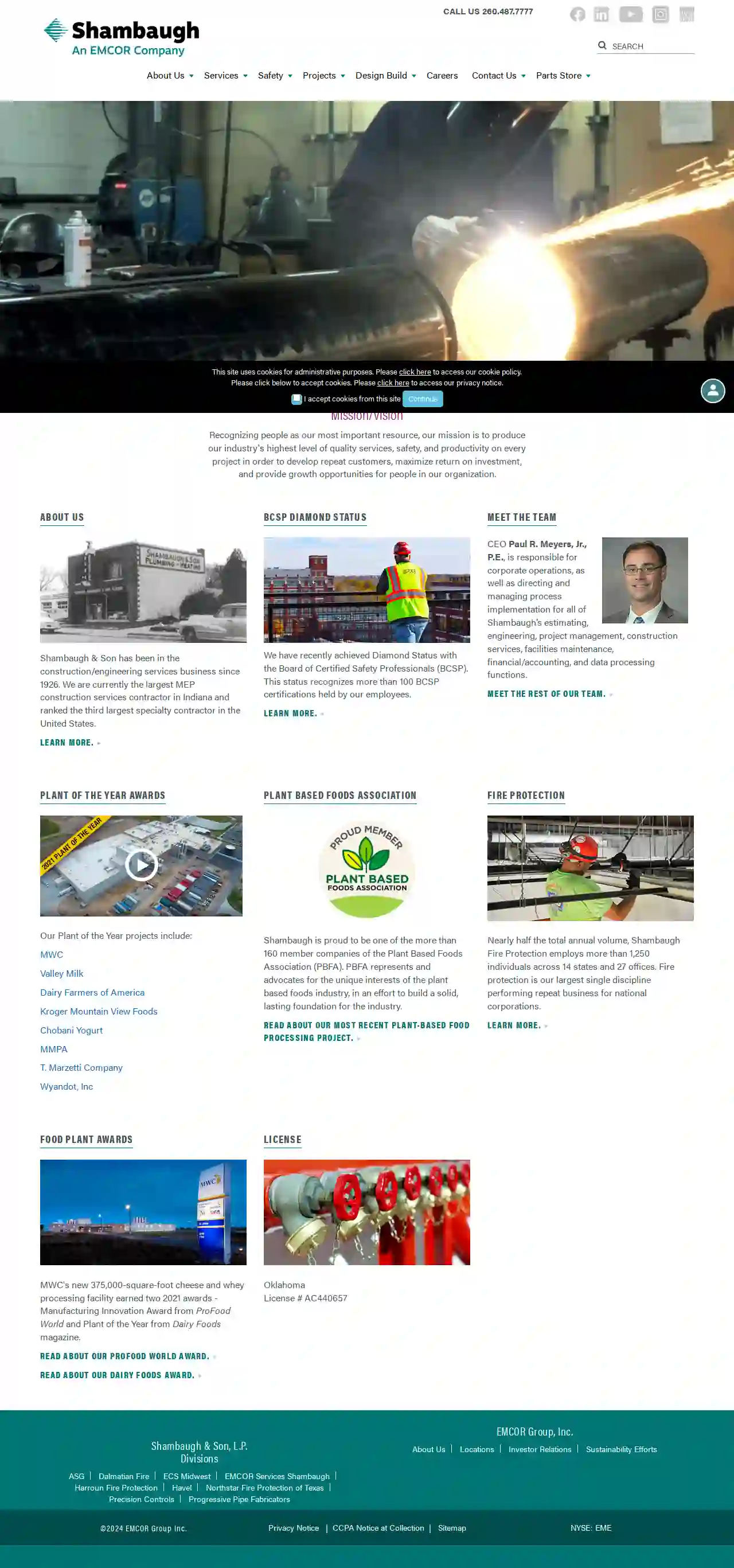
Shambaugh & Son, L.P.
4.287 reviewsWayne, USMission/Vision Recognizing people as our most important resource, our mission is to produce our industry's highest level of quality services, safety, and productivity on every project in order to develop repeat customers, maximize return on investment, and provide growth opportunities for people in our organization. About Us Shambaugh & Son has been in the construction/engineering services business since 1926. We are currently the largest MEP construction services contractor in Indiana and ranked the third largest specialty contractor in the United States. BCSP Diamond Status We have recently achieved Diamond Status with the Board of Certified Safety Professionals (BCSP). This status recognizes more than 100 BCSP certifications held by our employees. Meet the Team CEO Paul R. Meyers, Jr., P.E., is responsible for corporate operations, as well as directing and managing process implementation for all of Shambaugh’s estimating, engineering, project management, construction services, facilities maintenance, financial/accounting, and data processing functions. Plant of the Year awards Our Plant of the Year projects include: MWC Valley Milk Dairy Farmers of America Kroger Mountain View Foods Chobani Yogurt MMPA T. Marzetti Company Wyandot, Inc plant Based foods association Shambaugh is proud to be one of the more than 160 member companies of the Plant Based Foods Association (PBFA). PBFA represents and advocates for the unique interests of the plant based foods industry, in an effort to build a solid, lasting foundation for the industry. fire protection Nearly half the total annual volume, Shambaugh Fire Protection employs more than 1,250 individuals across 14 states and 27 offices. Fire protection is our largest single discipline performing repeat business for national corporations. Food Plant Awards MWC's new 375,000-square-foot cheese and whey processing facility earned two 2021 awards - Manufacturing Innovation Award from ProFood World and Plant of the Year from Dairy Foods magazine. LICENSE Oklahoma License # AC440657 Shambaugh & Son, L.P. Divisions ASG Dalmatian Fire ECS Midwest EMCOR Services Shambaugh Harroun Fire Protection Havel Northstar Fire Protection of Texas Precision Controls Progressive Pipe Fabricators EMCOR Group, Inc.
- Services
- Why Us?
- Our Team
- Gallery
Get Quote
Torshel Tornado Shelters & Safe Rooms
53 reviewsBrick, USThe fastest way to get your storm shelter is by selecting the product or products of your interest. Then, proceed to fill out the contact form online, and a sales representative will be in touch with you. The installation time for the above and in-ground units is 1-3 weeks, depending on your location. Commercial building installation time is 3-6 weeks, depending on the size and your location. If you are building a house, make sure that you order your storm shelter ahead of time. Thank you very much, stay safe! Financing Options We’ve Been Protecting Families & Businesses For Over 9 Years Buying a storm shelter is an important decision. Torshel is committed to helping you choose the best type of shelter for both your home and budget. Both underground shelters and safe rooms offer maximum protection for storms. We encourage our clients to compare the quality of our shelters, methods of installation, and the reputation of the companies. There have been a few cases where other companies have poorly installed in-ground shelters that slip out of the ground. As a result, people can be terribly injured, and in some cases, death may occur. Some companies put profit over the lives of those who will use their products. At Torshel we work to make sure that we save and help protect as many lives as possible. We only install the highest quality storm shelters available in the market and stand behind our work by offering a 10-year warranty. We make ourselves available before and after the shelter’s installation. Commercial and Residential Storm Shelters Welcome to Torshel Storm Shelters, a leading company in the storm shelter and safe room industry. We have the best products, at an affordable price. We proudly install and serve Alabama, Arkansas, Florida, Kentucky, Louisiana, Mississippi, Tennessee, Texas, Georgia, and surrounding states. However, we sell, and ship storm shelters anywhere in the United States. We have clients in Dallas, New York, Miami, Seattle, Los Angeles, and many rural areas around the country. Enjoy your visit to our website. Take a look at our videos, pictures, and testimonials from multiple clients. We know this is an important decision. Know that if you chose us, you will get great customer service and a top-of-the-line storm shelter backed by a 10-year warranty. Torshel offers discounts to customers who purchase two or more units. Protect your family with a Torshel shelter manufactured to withstand EF5 category tornadoes. Torshel offers underground storm shelters and above-ground safe rooms of various sizes that meet or exceed FEMA’s stringent safety standards. Our tornado shelters are also more durable than traditional storm cellars. Let your neighbors, coworkers, and friends know about your purchase of your storm shelter. If they want to buy one during the same delivery and installation trip, everyone can save a lot. A case in point, Mr. Kyle told Mr. Will about his new in-ground shelter; Will liked the product and decided to purchase one. Torshel delivered and installed two units, and offered them discounts! John and George partnered installing a big shelter in-between their houses, both saved and both of their families can have direct access to the shelter. Commercial Storm Shelters The most valuable asset of any company is not its facilities, machines or products. It’s their team of employees, executives, and clients. Torshel can help protect them while at work with a commercial multipurpose storm shelter, panic room, and safe vault in the event of a tornado, hurricane, robberies, shootings, and other types of incidents that may put in danger their safety. You, your staff, and clients will have a peace of mind by having a steel safe room ready for any threating occasion. Storm Shelter in your Garage Torshel storm shelters are made of structural heavy-duty steel and are one of the bests available in the United States. Our storm shelters are well constructed and properly anchored. Such units will withstand an EF5 tornado according to engineers and professionals at Texas Tech University. They are the perfect solution for the elderly, people with disabilities, claustrophobia, and clients who want an easy to reach safe room in their garage. Inground Tornado Shelters For clients that live in mobile homes, or do not have a garage, we offer underground outdoor shelters. These underground units reflect Torshel’s latest technology. They come with a 13” x 13” bullet-resistant window made of 1.5” polycarbonate. The window allows natural light to flow inside the shelter. You won’t feel entrapped. Torshel’s Newest and High Technology Feature! 4-6 cubic yards of 3,000 PSI concrete will keep the unit inside the ground and prevent it from floating. Let’s Keep Your Family Safe The sooner the better, fill our online form and one of our talented representatives will contact you to help you with any question you might have.
- Services
- Why Us?
- Testimonials
- Gallery
Get Quote
Nivek Earthworks LLC
58 reviews3831 Nantucket Dr., Fort Wayne, 46815, USAbout Us Nivek Earthworks LLC is a total site development company serving the greater Fort Wayne community and is owned and operated by Kevin Horgan and Jared Shelton. Not only do Jared and Kevin share a lifelong passion for the excavation industry, but they are also extremely passionate about customer service and take pride in going above and beyond for each of their clients. Together, Jared and Kevin have nearly two decades worth of experience in the construction industry, and have developed a strong skillset for moving dirt. They love what they do and are committed to continually producing exceptional excavation services for the members of the Fort Wayne community. Project Highlights “Often Imitated Never Duplicated” Ready to Start Your Next Project? It all begins with an idea. Whether you are a homeowner or a contractor, we would love to meet with you to discuss your next project. We are here to help during the planning stages of your project and can offer our expertise to determine the best approach, create schedules, and identify possible roadblocks that would normally lead to costly extras if discovered during the construction process. We always offer free estimates and include our detailed plan of the work to be completed. Give us a call or email us today to start the planning process on your next project.
- Services
- Why Us?
- Our Team
- Testimonials
- Gallery
Get Quote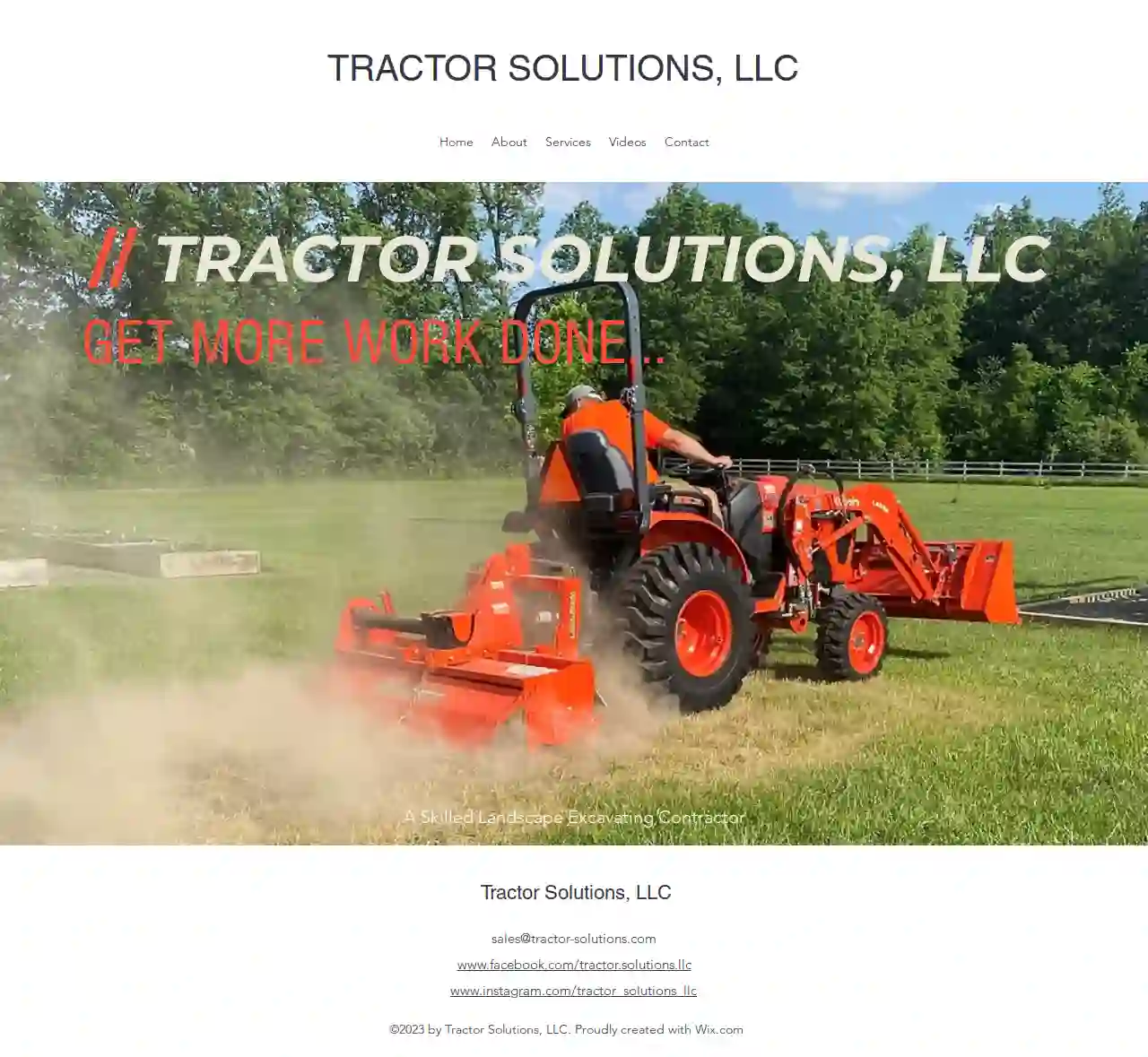
Tractor Solutions, LLC
Wayne, USGet More Work Done... Tractor Solutions, LLC is a skilled landscape excavating contractor dedicated to providing high-quality services and exceeding client expectations. We understand the importance of efficiency and effectiveness in your projects, and we strive to deliver results that meet your specific needs.
- Services
- Why Us?
- Gallery
Get Quote
Niblock Excavating
11 reviews906 Maple St, Bristol, 46507, USFull Service. Family Run. Formidable Capabilities. For over seven decades, Niblock has been delivering top-notch earthwork, underground utility work and paving in Northern Indiana and Southern Michigan. With a crew over 100 strong, we handle all facets of large civil work while offering the efficient communication and personalized service of a family run company. The Niblock Difference Done Right the First Time, Every Time It’s a cliche claim, but no less true. We hold ourselves to the highest standards in all we do. In fact, we’ve actually turned down work when specifications don’t meet our standards. When you choose Niblock, you can count on long term durability. More than Muscle, Experienced Problem-solving Partners With decades of experience, we’ve seen it all. We’re always on the lookout for ways to improve performance and make your application more efficient. We’ve helped clients reroute access and layout for better traffic flow, spotted ways to improve drainage, dramatically expand capacity with minor alterations, and more. Tightly Coordinated, Family Run We pack big capabilities into a small-company feel, enabling us to communicate more efficiently and eliminate approval bottlenecks. You’ll get personalized service and a simple, single point of contact for all of your job needs. On Time and On Budget It seems delays and overruns are standard operating procedure for many, but not at Niblock. We’re experienced and realistic in our projections. We pride ourselves on sticking to our budget and deadline commitments. A Steady History You can Count On For three generations, Niblock has been delivering top-notch work in Northern Indiana and Southern Michigan. We have a stable, long-term track record. When we say we stand by our work, you can be assured we’ll be here to do just that for many years to come.
- Services
- Why Us?
- Gallery
Get Quote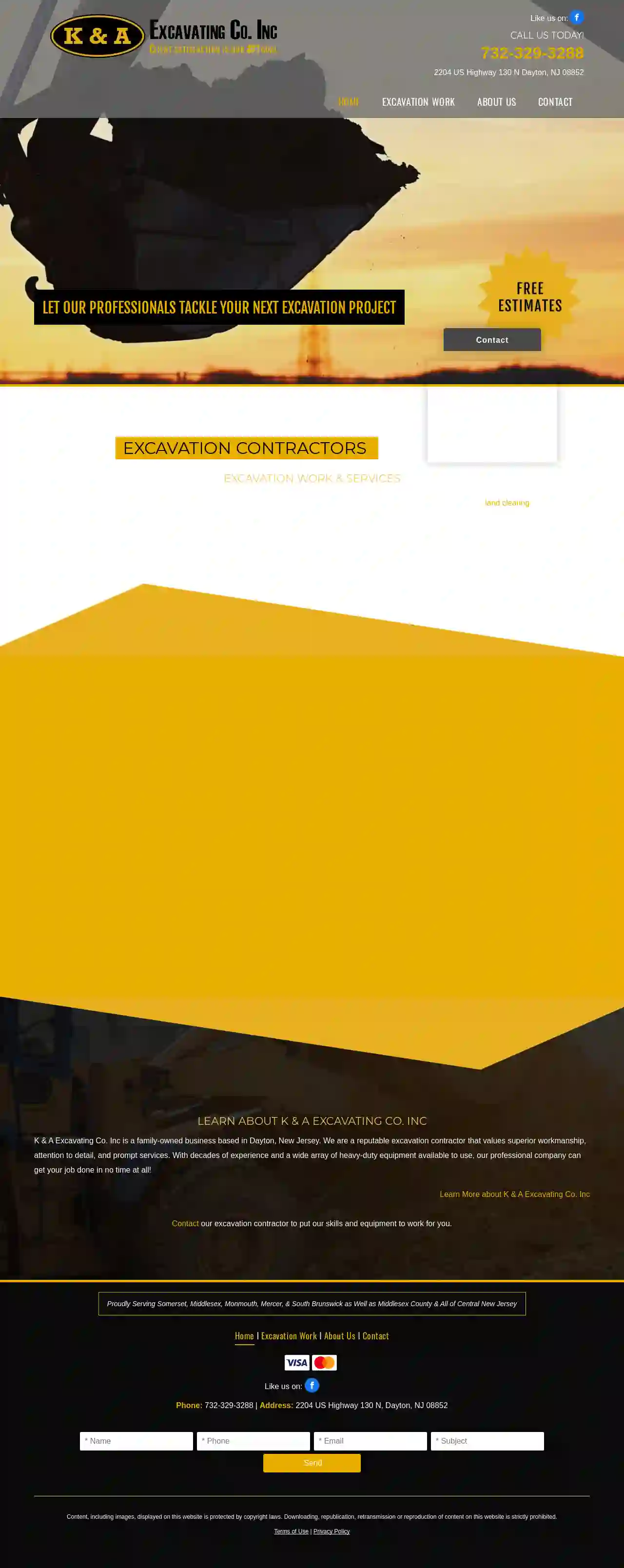
K & A Excavating Co Inc.
4.522 reviews2204 US Highway 130 N, Dayton, 08852, USAbout K & A Excavating Co. Inc K & A Excavating Co. Inc is a family-owned business based in Dayton, New Jersey. We are a reputable excavation contractor that values superior workmanship, attention to detail, and prompt services. With decades of experience and a wide array of heavy-duty equipment available to use, our professional company can get your job done in no time at all! At K & A Excavating Co. Inc, we have built our reputation on our commitment to providing quality service, which has earned us many valuable customers. With more than 30 years of experience, we are the go-to company for customers when they're in need of asphalt removal, land clearing, or site preparation. Our company uses only the best equipment for each job. In addition, we maintain a skilled staff to perform all projects. They are more than happy to answer any of your questions regarding our services. K & A Excavating Co. Inc's mission is to provide customers with courteous and friendly service and quality workmanship. Request a free estimate from us today for your project!
- Services
- Why Us?
- Gallery
Get Quote
Structure Tone LLC
56 reviewsWoodbridge, USWho We Are We are a family of companies building amazing spaces across the US, Canada, UK and Ireland. History Founded in 1971, we have grown into an organization made up of over 4,700 employees across 54 offices.
- Services
- Why Us?
- Gallery
Get Quote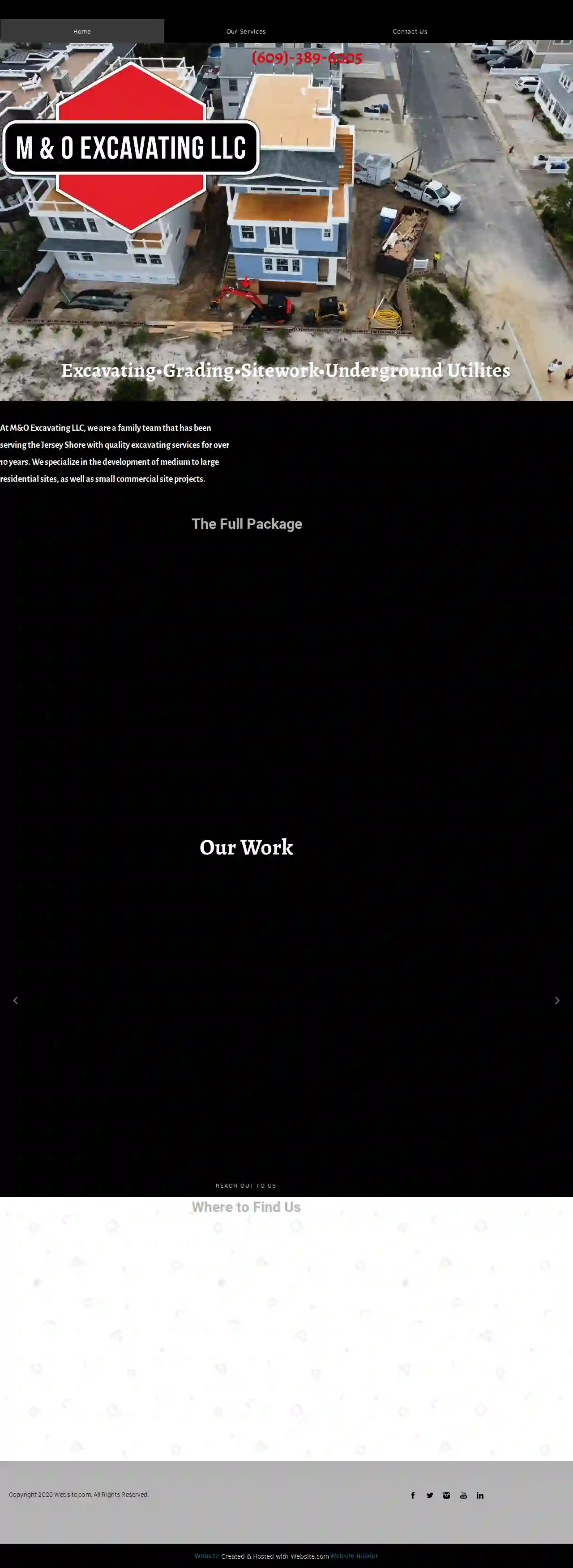
M&O Excavating LLC
51 reviewsPO Box 185, Manahawkin, 08050, USAt M&O Excavating LLC, we are a family team that has been serving the Jersey Shore with quality excavating services for over 10 years. We specialize in the development of medium to large residential sites, as well as small commercial site projects. The Full Package REACH OUT TO US Where to Find Us Excavating•Grading•Sitework•Underground Utilites Our Work
- Services
- Why Us?
- Gallery
Get Quote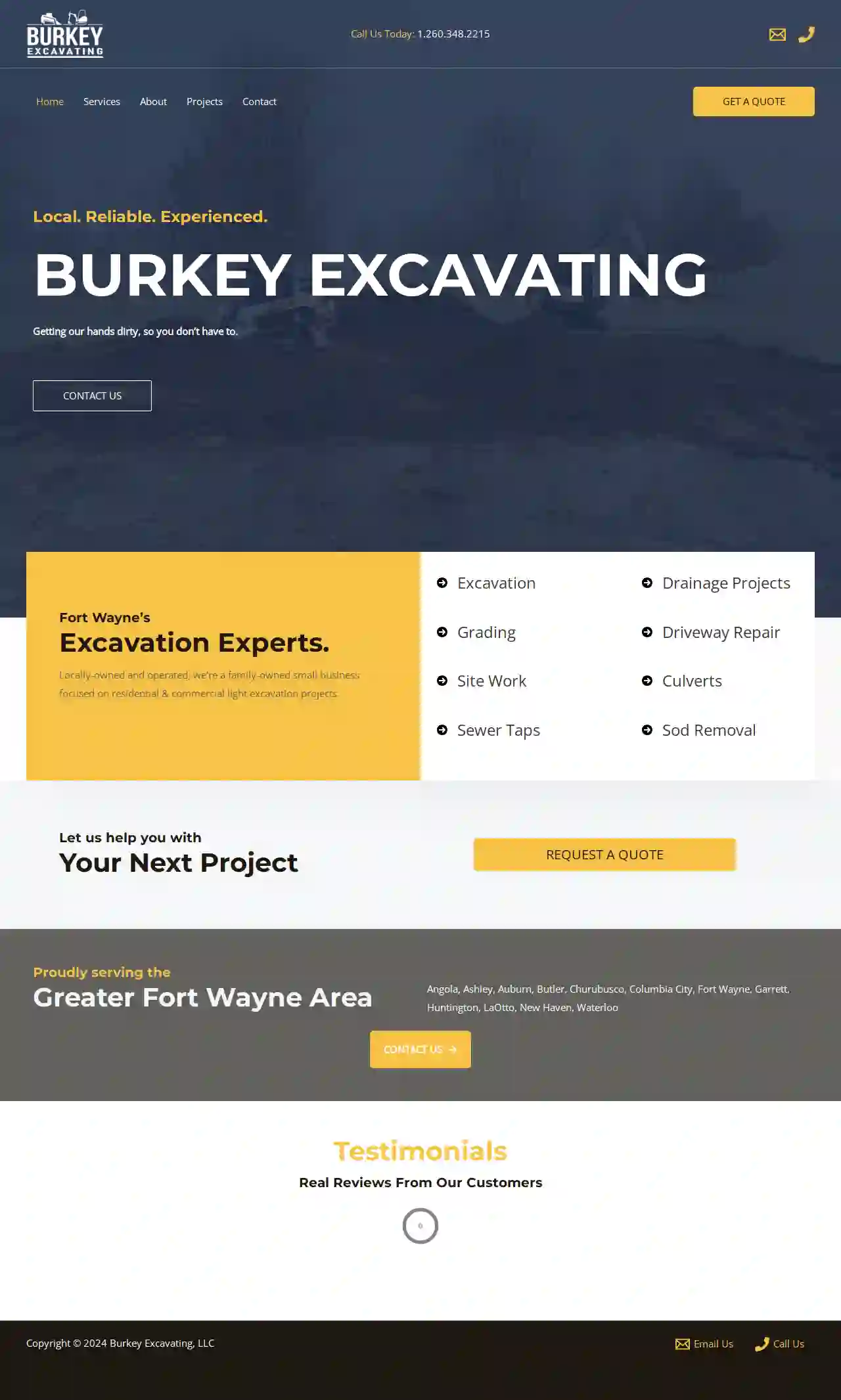
Burkey Excavating LLC
53 reviewsWayne, USBurkey Excavating: Your Local Excavation Experts Burkey Excavating is a family-owned and operated business serving the Greater Fort Wayne area. We specialize in residential and commercial light excavation projects, providing reliable and experienced service to our customers. We understand that excavation projects can be stressful, so we strive to make the process as smooth and hassle-free as possible. Our team is dedicated to providing high-quality work at competitive prices. We are committed to providing our customers with the best possible experience. We are always available to answer your questions and address your concerns. We are also committed to safety and environmental responsibility. We use the latest equipment and techniques to ensure that our projects are completed safely and efficiently. We are proud to serve the following communities: Angola, Ashley, Auburn, Butler, Churubusco, Columbia City, Fort Wayne, Garrett, Huntington, LaOtto, New Haven, Waterloo.
- Services
- Why Us?
- Gallery
Get Quote
In Earth Excavating & Contracting, Inc
4.36 reviewsWoodbridge, USIn Earth Excavating & Contracting, Inc. In Earth Excavating & Contracting, Inc. is a woman-owned business that is insured, licensed, and certified by the NJDEP. We are also OSHA trained and Roth-certified installers. We specialize in tank installations and tank removal services, as well as tank locating and much more! We offer start-to-finish solutions for every project and also many other services. We also work in collaboration with Frey Engineering for Septic Systems, Geotechnical and Environmental Services. Check out samples of our recent work on our Facebook page, and you'll agree that we're the best choice. Quality Excavation and Contracting Guaranteed: +1.908.246.6891
- Services
- Why Us?
- Our Team
- Testimonials
- Gallery
Get Quote
Over 22,076+ Excavation Pros registered
Our excavation contractors operate in Rockaway and surroundings!
ExcavationHQ has curated and vetted the Best Excavation Contractors in Rockaway. Find a trustworthy contractor today.
Frequently Asked Questions About Excavation Contractors
- Determining Soil Suitability: Assessing whether the soil can support the intended structure or load.
- Recommending Foundation Types: Advising on the appropriate foundation design based on soil characteristics.
- Addressing Drainage and Erosion Issues: Providing solutions to manage water runoff and prevent erosion.
- Evaluating Slope Stability: Assessing the risk of landslides or soil movement on slopes.
- Building on challenging soil types (expansive clay, loose sand, etc.)
- Constructing large or complex structures
- Excavating near slopes or retaining walls
- Addressing drainage or erosion concerns
- Determine the Area: Measure the length and width of the area you want to fill. Multiply them to get the area in square feet (or meters).
- Determine the Depth: Measure the difference between the existing grade and the desired grade (how much you need to raise the ground). This is the depth of fill required.
- Calculate Volume: Multiply the area (step 1) by the depth (step 2) to get the volume in cubic feet (or meters).
- Account for Compaction: Fill dirt compacts when it settles, so add 10% to 25% to the calculated volume to account for compaction. The exact percentage depends on the type of fill material.
- Excavators: Versatile machines with a bucket, arm, and rotating cab for digging, lifting, and moving earth.
- Backhoes: Similar to excavators but with a digging bucket on the back and a loader bucket on the front, ideal for trenching and smaller excavations.
- Bulldozers: Powerful machines with a large blade for pushing earth, clearing land, and leveling surfaces.
- Skid Steers: Compact and maneuverable loaders with various attachments (buckets, forks) for digging, loading, and grading in tight spaces.
- Trenchers: Specialized machines for digging narrow trenches for utilities.
- Dump Trucks: Vehicles for hauling excavated material to disposal sites.
- Project Size and Scope: Larger, more complex excavations naturally take longer.
- Soil Conditions: Rocky or challenging soil types can slow down progress.
- Site Accessibility: Limited access might require more time for maneuvering equipment and hauling materials.
- Weather: Inclement weather can cause delays.
- Permitting and Inspections: Waiting for permits or inspections can extend the timeline.
What is a soil engineer, and do I need one?
How do I calculate how much dirt I need for fill?
What equipment is used for excavation?
How long does an excavation project take?
What is a soil engineer, and do I need one?
- Determining Soil Suitability: Assessing whether the soil can support the intended structure or load.
- Recommending Foundation Types: Advising on the appropriate foundation design based on soil characteristics.
- Addressing Drainage and Erosion Issues: Providing solutions to manage water runoff and prevent erosion.
- Evaluating Slope Stability: Assessing the risk of landslides or soil movement on slopes.
- Building on challenging soil types (expansive clay, loose sand, etc.)
- Constructing large or complex structures
- Excavating near slopes or retaining walls
- Addressing drainage or erosion concerns
How do I calculate how much dirt I need for fill?
- Determine the Area: Measure the length and width of the area you want to fill. Multiply them to get the area in square feet (or meters).
- Determine the Depth: Measure the difference between the existing grade and the desired grade (how much you need to raise the ground). This is the depth of fill required.
- Calculate Volume: Multiply the area (step 1) by the depth (step 2) to get the volume in cubic feet (or meters).
- Account for Compaction: Fill dirt compacts when it settles, so add 10% to 25% to the calculated volume to account for compaction. The exact percentage depends on the type of fill material.
What equipment is used for excavation?
- Excavators: Versatile machines with a bucket, arm, and rotating cab for digging, lifting, and moving earth.
- Backhoes: Similar to excavators but with a digging bucket on the back and a loader bucket on the front, ideal for trenching and smaller excavations.
- Bulldozers: Powerful machines with a large blade for pushing earth, clearing land, and leveling surfaces.
- Skid Steers: Compact and maneuverable loaders with various attachments (buckets, forks) for digging, loading, and grading in tight spaces.
- Trenchers: Specialized machines for digging narrow trenches for utilities.
- Dump Trucks: Vehicles for hauling excavated material to disposal sites.
How long does an excavation project take?
- Project Size and Scope: Larger, more complex excavations naturally take longer.
- Soil Conditions: Rocky or challenging soil types can slow down progress.
- Site Accessibility: Limited access might require more time for maneuvering equipment and hauling materials.
- Weather: Inclement weather can cause delays.
- Permitting and Inspections: Waiting for permits or inspections can extend the timeline.